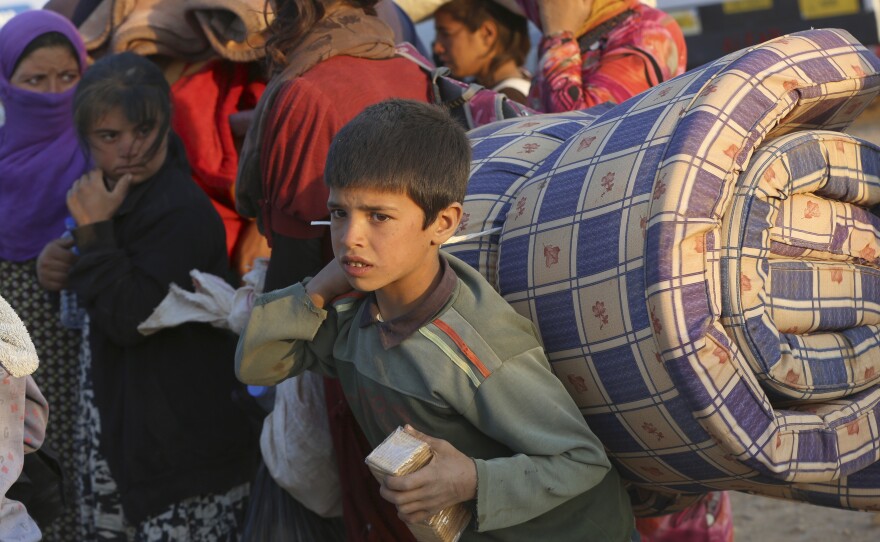Updated at 7:50 a.m. ET
Witnesses in eastern Syria near the Turkish border report a fresh round of airstrikes against Islamic State positions. The Pentagon later confirmed the reports.
Using an alternate name for the extremist group, the U.S. Central Command said in a statement:
"U.S. military forces continued to attack ISIL terrorists in Iraq and Syria, using a mix of attack, bomber and fighter aircraft to conduct five airstrikes Tuesday and today."Two airstrikes west of Baghdad destroyed two ISIL armed vehicles and a weapons cache. Two airstrikes southeast of Irbil destroyed ISIL fighting positions. A fifth airstrike damaged eight ISIL vehicles in Syria northwest of Al Qa'im. All aircraft exited the strike areas safely."
The new strikes come a day after the U.S. and five Arab allies carried out air attacks and cruise missile attacks across northern Syria, targeting not only the self-declared Islamic State, also known as ISIS or ISIL, but two other extremists groups – the Nusra Front and the largely unknown Khorasan group, which U.S. officials have said was planning attacks on U.S. and Western interests.
(NPR's Dina Temple-Raston has a detailed Khorasan explainer here.)
The Associated Press says of the latest attacks: "It was not immediately clear who carried out the airstrikes in and around Boukamal, the Britain-based Syrian Observatory for Human Rights said. But the activist group cited locals as saying the intensity of the air raids was similar to that of strikes on the town early Tuesday by the U.S.-led military coalition."
Reuters quotes Rami Abdulrahman, who runs the Syrian Observatory for Human Rights, as saying the border town of Albu Kamal and surrounding areas had been hit.
"Albu Kamal, on the main Euphrates River valley highway, is one of the most important border crossings between Iraq and Syria, along a frontier that Islamic State wants to erase after seizing territory both sides and declaring a caliphate," the news agency says.
President Obama is set to address the United Nations General Assembly today to discuss, in part, the ISIS threat.
NPR's Michele Kelemen reports that the Security Council is expected to adopt a resolution to encourage countries to crackdown on the flow of money to extremists and to encourage the the prosecution of citizens who join terrorist groups.
The latest strikes also come as Britain's Prime Minister David Cameron could announce soon that his country will join in the airstrikes.
"Cameron is due to set out his position in a speech to the U.N. General Assembly in New York on Wednesday night at which he will call on the world to unite to destroy Islamic State (IS)militants, whom he has warned are planning to attack Britain. "The decision to strike in Iraq would be at Baghdad's request. Cameron is due to meet Iraqi Prime Minister Haider al-Abadi on Wednesday. Sources in Cameron's office expect him to request British air strikes against IS during the meeting."
NPR's Ari Shapiro, reporting from London, says Iraq's President Fuad Masum is expected to ask for British military assistance and that Cameron will likely call for a vote in Parliament. Opposition leader Ed Milliband told the BBC he expects his party to support airstrikes against the group, which is also known as ISIL.
Meanwhile, the United Nations High Commissioner for Refugees has Turkey needs help urgently to deal with a sudden influx of more than 130,000 Syrian Kurds who have fled the fighting.
"On Tuesday, Turkish President Recep Tayyip Erdogan suggested Turkey could join military action against IS. "'We will give the necessary support to the operation. The support could be military or logistics," he told reporters in New York, where is attending the UN General Assembly meeting."
The U.N. World Food Program is also warning that money needed to feed Syria is simply not there.
Speaking to NPR's Morning Edition, the agency's emergency coordinator for Syria, Muhannad Hadi, says: "The problem is that we don't have enough funds to continue supporting the people inside Syria and the neighboring countries. It's very unfortunate. The Syrian people are now totally dependent on the World Food Program."
Copyright 2014 NPR. To see more, visit http://www.npr.org/.






